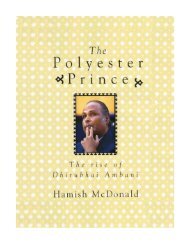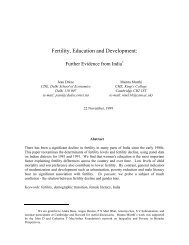knew nothing about them, but was sent to West Germany and Japan later for formaltraining. He stayed with Reliance until retirement in 1993. ‘<strong>The</strong> years passed beforewe knew it, we were so busy,’ Patel recalled.<strong>The</strong> result was steady growth in sales and profits for Reliance. In 1967, the first fullyear of production at Naroda, the company recorded sales of Rs 9 million in 1967,yielding a net profit of Rs 1.3 million. Dhirubhai and his family shareholders refusedto take dividends and kept ploughing earnings back into more machines. After adecade of manufacturing, in 1977 Reliance had a turnover of Rs 680 million, andprofits of Rs 105 million.In an extensive write-up on the company in August 1979, the Indian Textile Journalreported on a massive factory at Naroda occupying 230 000 square metres andemploying 5000 staff. It had banks of machines for texturising or primping artificialfibres to give particular sheens, machines for twisting the polyester and nylon fibresinto yarns, and machines for weaving the yarns into textiles. <strong>The</strong> yarns were sold toother Indian textile manufacturers, or used in-house.Most significantly perhaps, Dhirubhai established his own brand name, Vimal (namedafter a son of his brother Ramnik), by dint of lavish advertising under the slogan‘Only Vimal’. This somewhat snobbish slogan, and some well-publicised fashionshows in top-class hotels, added a touch of class to a product that basically appealedto the less wealthy market sectors. In addition, Dhirubhai had got around thereluctance of established wholesalers and shopkeepers to accept a new brand bycreating his own network of shops. Across India, some 400 shops were franchised tosell the Vimal brand of polyester materials for saris, shirts, suits and dresses.In one of the first of many eulogies to appear in the Indian press, the Textile Journalnoted how Dhirubhai was held in high esteem by his staff, who attributed Vimal’ssuccess to his dynamic leadership. ‘<strong>The</strong>n the construction of the factory was goingon, it is reported, many snakes were seen in the area. According to a popular belief,appearance of snakes is a good omen. Dame Luck certainly seems to have favouredMr. Ambani. Ever since the emergence of Vimal, he has developed the Midas touch.Everything he touches becomes gold. Everything he starts blossoms into success.Naturally, nothing succeeds like success.’
A FIRST-CLASS FOUNTAINDhirubhai Ambani remained in Bombay because manufacturing was only one facet ofhis business. For a decade, the textile plant at Naroda was supportive and subsidiaryto his yarn trading activities. In addition, he was steadily augmenting his skills atbreeding money from money, and at wielding political and bureaucratic influence ongovernment policies and their interpretation. Dhirubhai was never simply anindustrialist, a trader, a financial juggler or a political manipulator, but all four inone.From his earliest days in Junagadh, Dhirubhai had learned that relationships werethe key to unlocking help, and that the law could be argued with. ‘One thing I havenoted with Dhirubhai is that if he starts an acquaintance with someone he willcontinue it,’ said Manubhai Kothary, the trade group Sasrnira’s president. ‘He neverthrows away any relationship.’ He was endowed with a photographic memory forfaces and names, and any contact- however feeting - he could try to turn into acommon background on which some affection could be based. For example, SirNicholas Fenn, who was British High Commissioner in New Delhi in the early 1990s,was amazed to find Dhirubhai claiming him as an old friend from Aden. In the early1950s, Fenn had been a Royal Air Force pilot flying transports through to the FarEast and Australia. Dhirubhai remembered him from refuelling stops at the Shellfacility at Aden’s airport.philosophy was to cultivate everybody from the doorkeeper up. ‘I am willing tosalaam [bow down to] anyone,’ he told a magazine interviewer in 1985, in astatement that shocked many readers for its bluntness. In the India of economicplans and government control of the commanding heights’ that had developed by the1960s, a lot of grovelling was required for businessmen to get the clearances theyneeded. Inevitably, the bureaucratic signature needed to move a file from desk todesk came to have a price on it as well. <strong>The</strong> Congress Party had degenerated from amovement of freedom fighters into a dispenser of patronage, with ministersallocating resources and licences while the bureaucracy worked out ways to makethe process look objective.After getting on his feet back in Bombay, Dhirubhai used to make frequent trips toNew Delhi. He frequently went in the company of Murli Deora, a fellow yarn traderwho was then working his way up the Congress Party machine in Bombay. Deoralater became the head of the Bombay Municipal Corporation -the mayor- and thenfor many years the representative for South Bombay, the area containing thebusiness district and elite apartments, in the Lok Sabha (the lower house ofparliament).Dhirubhai and Deora used to catch an early fight up to Delhi, and park their bagswith a sympathetic clerk at the Ashoka Hotel while they did their rounds of politiciansand bureaucrats to speed up decisions on import licences. Too poor to afford anovernight stay, they would collect their bags and fly back to Bombay the sameevening. Later, Dhirubhai could afford to keep a room ready at the Ashoka, agovernment hotel built in a vaguely Moghul monumental style. His nephew RasikMeswani also came into the lobbying activity, and eventually selected a canny SouthIndian, V Balusubramaniam, as full-time lobbyist for Reliance in New Delhi. For thelesser bureaucrats, journalists and others who helped promote the company’s
- Page 2: AcknowledgementsIntroduction: an in
- Page 7 and 8: several years. I sent off some clip
- Page 9 and 10: esearch led me into all corners of
- Page 11 and 12: A PERSUASIVE YOUNG BANIAAmong all t
- Page 13 and 14: proportion of these from Kathiawar.
- Page 15 and 16: looked far beyond their immediate p
- Page 17 and 18: which involved boycotting imported
- Page 19 and 20: One of the students was a fellow Mo
- Page 21 and 22: The outpost had been a punishment s
- Page 23 and 24: As he developed more familiarity wi
- Page 25 and 26: water and haven for international t
- Page 27 and 28: Junagadh named Rathibhai Muchhala a
- Page 29 and 30: eing ‘suite luxurious’ compared
- Page 31: Dhirubhai was again lucky in that,
- Page 35 and 36: minority government in 1996, and se
- Page 37 and 38: Corporation of India. Soon afterwar
- Page 39 and 40: Over two years in the early 1970s,
- Page 41 and 42: captive market. The ‘Eleven Day W
- Page 43 and 44: GURU OF THE EQUITY CULTIndira Gandh
- Page 45 and 46: politicisation of the machinery Fro
- Page 47 and 48: By the end of 1986, Dhirubhai was t
- Page 49 and 50: Reliance made sure that a comment b
- Page 51 and 52: half-hour of panic just before the
- Page 53 and 54: politicians and bureaucrats. ‘It
- Page 55 and 56: Friends in the right PlacesThis was
- Page 57 and 58: act of parliament as far back as 19
- Page 59 and 60: control, and a very long and favour
- Page 61 and 62: in the Telegraph’s leader. Facing
- Page 63 and 64: In December 1983, Dhirubhai had hos
- Page 65 and 66: Pydhonic to sell his polyester and
- Page 67 and 68: give money to political parties. We
- Page 69 and 70: estimated demand of 80 000 tonnes o
- Page 71 and 72: support the big investment in domes
- Page 73 and 74: others. Orkay was accused of pledgi
- Page 75 and 76: corruption. On the backs of ordinar
- Page 77 and 78: Financial Express, had carried both
- Page 79 and 80: constant ridicule and demonisation.
- Page 81 and 82: inquiries overseas, the little-trav
- Page 83 and 84:
conversion was allowed, the holding
- Page 85 and 86:
The company’s shares had already
- Page 87 and 88:
In a four-part article published ov
- Page 89 and 90:
The case against Reliance had been
- Page 91 and 92:
companies, possibly to help strengt
- Page 93 and 94:
Nusli Wadia’s children). Pandit b
- Page 95 and 96:
carrying a relentless, campaign of
- Page 97 and 98:
The committee asked Reliance at lea
- Page 99 and 100:
To clinch a prosecution under the F
- Page 101 and 102:
operators of the Indian havala trad
- Page 103 and 104:
While the law enforcers were closin
- Page 105 and 106:
the obligatory disclosures in the p
- Page 107 and 108:
On 5 December, the Central Excise a
- Page 109 and 110:
LETTING LOOSE A SCORPIONDhirubhai A
- Page 111 and 112:
identified himself as an inquiry ag
- Page 113 and 114:
But the CBI’s two investigating o
- Page 115 and 116:
had been booked into the hotel unde
- Page 117 and 118:
dismissing Rajiv and appointing ano
- Page 119 and 120:
extended and gruelling interrogatio
- Page 121 and 122:
BUSINESS AS USUALDhirubhai Ambani w
- Page 123 and 124:
udget for the year starting April 1
- Page 125 and 126:
asket from UTI (by value) were Lars
- Page 127 and 128:
on the Financial Times of London. A
- Page 129 and 130:
1988, two allied activists, journal
- Page 131 and 132:
But just as the opposing forces see
- Page 133 and 134:
had continued social meetings with
- Page 135 and 136:
they recorded Babaria calling Kirti
- Page 137 and 138:
arrests on 1 August. When a reporte
- Page 139 and 140:
After the initial appearance of Kir
- Page 141 and 142:
Though he could not avert the storm
- Page 143 and 144:
Dhirubhai’s new newspaper, launch
- Page 145 and 146:
and indifferent to the bloodshed in
- Page 147 and 148:
temple at Ayodhya, he put off the f
- Page 149 and 150:
arriving at Rajiv’s heavily guard
- Page 151 and 152:
Securities and Exchange Board of In
- Page 153 and 154:
The shouting continued for half an
- Page 155 and 156:
The 1991-92 boom helped Dhirubhai q
- Page 157 and 158:
Because of this burden, any other n
- Page 159 and 160:
the proceeds of the previous Euro-i
- Page 161 and 162:
The telephone licences covered near
- Page 163 and 164:
HOUSEKEEPING SECRETSOn 29 November
- Page 165 and 166:
compliant bank to give in return fo
- Page 167 and 168:
According to sources close to the M
- Page 169 and 170:
Merrill Lynch. Jain had meanwhile c
- Page 171 and 172:
put on its screens. On 29 November,
- Page 173 and 174:
1992 into the tax evasion aspects o
- Page 175 and 176:
At least one former fund manager, a
- Page 177 and 178:
and avoids a prosecution in court.
- Page 179 and 180:
Reliance could no longer look eithe
- Page 181 and 182:
other hand, the ANZ Grindlays bank




